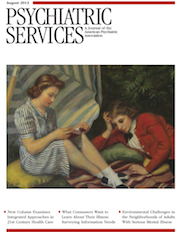Relationship Between Relapse and Hospitalization in First-Episode Psychosis
Abstract
Objective
Relapse is a frequently used outcome measure in schizophrenia research. However, difficulties in reliably measuring relapse diminish its usefulness. Hospitalization is a potential alternative, but its relationship to relapse has not been assessed.
Methods
This study used data from a two-year, prospective study to examine associations between relapse and hospitalization in a cohort of 200 Canadian patients with first-episode psychosis. First, the relationship between relapse and hospitalization was assessed by cross-tabulating relapse and hospitalization. Next, survival curves of time to first relapse or hospitalization were compared. Finally, to examine the convergent validity of relapse and hospitalization, the predictive capacity of three predictors were examined: a substance use disorder diagnosis, prior hospitalization, and medication adherence.
Results
Rates of both relapse and hospitalization were similar. During the two-year follow-up, 37% of the patients experienced a relapse, and 26% were hospitalized. As an indicator of relapse, hospitalization had a low sensitivity (47%) and high specificity (87%). A higher risk of hospitalization and relapse was associated with prior hospitalization, a substance use disorder diagnosis, and medication nonadherence.
Conclusions
Results indicated that relapse and hospitalization are separate but related outcome measures. They had similar frequencies and were found to have similar relationships with some predictors. Relapse is a more useful outcome measure in smaller clinical studies in which routine standardized clinical measures can be used. Hospitalization is more relevant in larger studies or as a quality indicator for studies using administrative databases, and it serves as a good measure for quality management in health systems.



